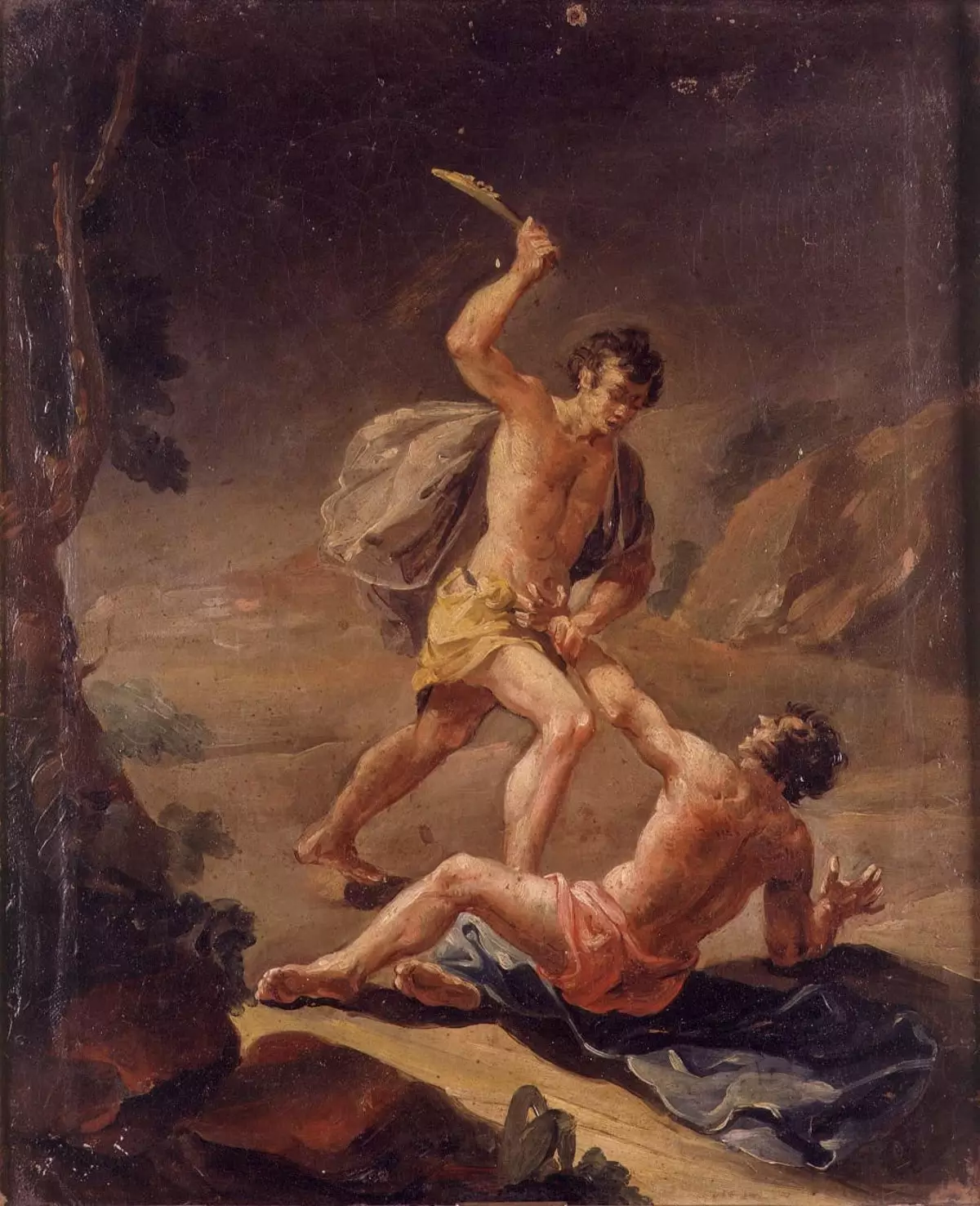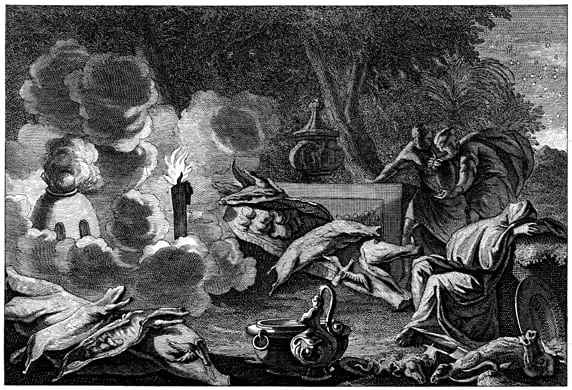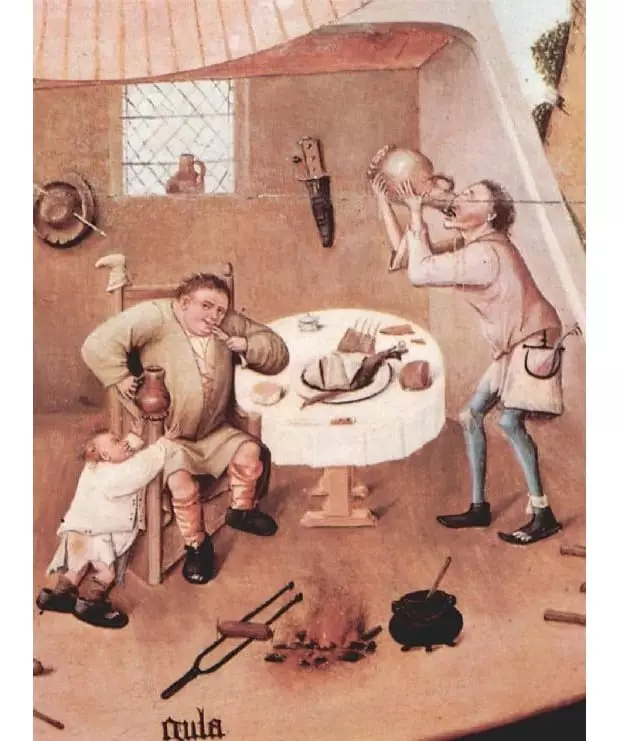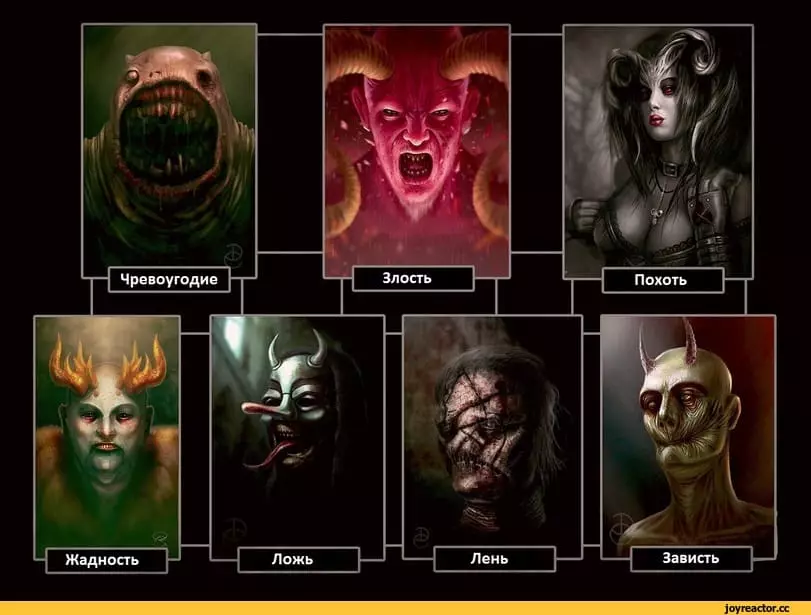Most of the believers during the reading of holy writings and other diverse religious literature often pay attention to the expression "seven death sins". This phrase applies not to some other or specific seven actions. The list of limits may be much more, but it is these seven acts that are united by something big, why are called "mortals."
The first classification was offered another five hundred and ninth year Gregory Great. There is a different separation in the church, which is the compilation of not seven, but eight mortal sins and major passions. The word "passion" translated from the Church Slavonic language will mean suffering. Some believers and preachers concluded that there are ten death sins in Orthodoxy.
Mortal sin is the hardest and most difficult of all possible passions. Overgrowers are bothering only with sincere repentance. When making such sins, even one, the path to paradise is no longer lies. In the main classification in Orthodoxy, believers have only eight mortal sins.
Pride, or "Sin Lucifer"
Find out what awaits you today - a horoscope for today for all zodiac signs

Pride is considered one of the most severe sins, as it happened from Satan himself. The history of this sin is rising to the creation of the world of Angelic. One of the highest angelic and most powerful, Dennica, did not want to be in obedience and love for the Lord. This angel was extremely regenerated by his strength and power and wanted to become the thieves of God. Dennica fascinated by many angels, which is why the war was unleashed in the sky. Archangel Mikhail, along with his angels, fighting with Satan, won the evil army. Satan Lucifer, like lightning, fell from the kingdom of heavenly to hell. Since then, hell, the underworld is the habitat of the dark spirit, the place deprived of God's grace and light.
The man who is sinful pride is the continuer of Lucifer's business on Earth. Gordinity entails all other sins, even those that are not included in the list of seven mortals.
Pride is an excessive faith in itself and its capabilities that comes in contradiction with the Great Lord. The person who is in such a sin is praised by his qualities, forgetting who presented them with him. Simply put, pride is extremely overestimated self-esteem, the exaltation of their actual qualities and imaginary good features. This is an overestimated self-esteem. In such cases, a person believes that he is better than in fact, and better than all other people. This leads to arrogance, arrogance. This is a biased assessment, selflessness, which leads to the commitment of terrible mistakes in life. This is a self-ability, blind worship himself. The amount of pride is also hostility to others.
By numerous requests of readers, we have prepared an application "Orthodox calendar" for a smartphone. Every morning you will receive information about the current day: Holidays, posts, commemoration days, prayers, parables.
Download free: Orthodox calendar 2020 (Available on Android)
One of the effective ways to overcome the pride is serving society, the Lord and relatives. By giving yourself another, a person can change.
Pride is a source of negative thoughts and emotions. These things adversely affect the psychological state of a person and his behavior. Too much sense of importance of himself gives rise to aggression towards the surrounding world.
Greed

The second estimate sin in Christianity. Alich is called a greedy or a stingy person who is inclined to increase its wealth. This sin is divided into a desire to get more than a person already has, "greed and unwillingness to lose what he has, the desire to maintain it - misfortune. Decisions excites internal ailments, such as fear and anger. A man walking on his heads using comrades, not believing with the opinion of others, produces for himself those goods that the roads to him. A person who is in such a sin puts money in his life first place, material benefits preferring to their spiritual values. The sinner is often ready to spend most of his time for recalculation of available wealth. If suddenly, his wealth will be lost, then the man will feel the emptiness in his soul, the meaning of life will be lost.
The life of such a person often accompanies anger. This is a natural feeling for the greedy person. It is not interested in anything other than the material benefit. The mental emptiness of such a person fills money or things. The root of this vice is a feeling of insecurity, danger, instability.
The main problem of greed in religion and psychology is the degradation of a person's personality. The individual just wants to be happy and believes that it will achieve this with the help of the preservation and accumulation of material. The feeling as if the more it has, those will be happier. But due to the fact that such things are not happy for a long time, you have to acquire them again and again.
Envy

This sin, including forbidden ten commandments. The man in this sin wants to have what he does not belong. The subject of envy is both material things and spiritual. According to religion, God gives everyone, then it is necessary to specifically with this person in accordance with the Lord's plan. And the desire to have the fact that the Lord bestowed, contradicts and seeks to fulfill the personal will of the Lady of God. Despite the fact that envy is one of the seven mortal sins, and the fact that this vice person delivers a lot of trouble and trouble, envy still lives in each, and failed to get rid of it.
Each person to some extent is subject to this sin. This is explained by the fact that everyone has a certain amount of needs and needs, which he often cannot satisfy in his life, but sees them from other people. In addition, it is much easier to explain its shortcomings and misses not with their problems (lazy or weakness), and misses and injustice of fate, which is incomprehensible why it is beneficial to someone else, and not to us.
In the history of mankind there are many examples of envy. In the Bible, this brothers Cain and Abel, the sale of Joseph to slavery because of the love of the Father. Parable about King Saul and defenseless David. The whole life path of Jesus Christ was accompanied by human envy. With the help of examples from the new and dilapidated covenant, it can be understood that over a long time envy filled the souls and hearts of people.
Anger

This mortal sin is a manifestation of the "irritable" part of the soul. As a weapon, God gave a reasonable anger to a person, this is the power of the soul, with which a person opposes evil. As a result, this rational force is perverted and becomes the scary for the personality. The wrath has many varieties. It has a kind of snake, which breaks out young, more dangerous and poisonous than himself. Young these are: envy, jealousy, maliciousness, rage either hatred and maliciousness. All these features make a person and his close unhappy. This sin is anger - we combine with other passions, in this case a wide variety of defects appear.
Wrath with misfortune gives rise to a negative attitude towards the poor and poor. The sinner looks at such a person, as if on the aggressor, which hesitates on his property. He will call them deceivers and loafers.
Anger, combined with sadness, gives rise to annoyance and irritability, dissatisfaction with everyone and all around.
Anger and despondency generates hot hatred, contempt for life itself, often even aggressive atheism. This condition often can cause suicide.
Anger in combination with vanity can generate avenue and envy. For such a sinner, the enemy will already be the person who surpassed either in something ahead of him. A man in sin is ready to use the most appreciated and low funds in the evil: slander, denunciations, stingy ridicule.
Pride in combination with anger creates hatred in relation to humanity.
Lust or Blud.

According to the dictionary, lust means sexual attraction, rude and voluptuous. In Christianity, lust - "illegal passion, corruption of hearts, which has an evil and sin." Lust and sin are closely connected with each other, this is stated in the epistles from the apostles, which make up part of the New Testament. Lust or, how this sin is also called, for a blud is not equivalent to the word love. The latter implies a bright sense aimed at the object of his interest. The fundamental components of these feelings were and remain respect and the desire to disinterestedly do something pleasant for his partner. Love does not combine with egoism, due to the fact that it initially aims to sacrifice.
A person who is subject to this sin cannot be concentrated on something else. The sinner is in power of passion. He looks at women as like a lady is an object of passion and quenching animals desires, and no more. Dirty thoughts, filling his consciousness and overshadowing the soul, buys them.
A lustful person incessantly remembers his animal desire and about passions, these feelings do not leave him. Because of this, the sinner constantly wants those who are still on him and which he is essentially not needed, and if necessary, then the sinners will drive him, looking for new pleasures, trampled and humiliating the feelings of another. This is due to the fact that lust and fornication are based only on sexual, sexual visiting, which is not combined with respect and holiness of feelings.
Gluttony

The gluttony is often referred to as vague. This sin is a kind of addiction to exceeding the norm to overeat. This also includes drinking. One of the main sins in Christianity is precisely gluttony. Such a soda of the soul, and the person himself. This is due to the fact that the excessive swelling is often immersed in the dark dormant, empties him and makes lazy, the latter is another point in the list of mortal sins.
A person, which is susceptible to the sin of an overlooking, cannot lead reasonable reasoning on spiritual themes, as well as to comprehend much deep enough. The womb of such a person is a similarity of lead weights, which pulls down the soul, peeling with vices and sins.
Religion has many ways to get rid of this sin: it is both prudence, and the content of the post, and the memory of the Supreme Court, about the predominance of spiritual over the material.
The womb is called a man living for their stomach. All plans and desires are aimed at going. The sinner lives and works in order to acquire a variety of food. Single people with such sin are often selfish. In case the sinner is connected by the Uzami marriage and family life, it will be a disaster for the whole family.
Sadness and laziness
The despondency differs from ordinary sorrow by the fact that the first is more closely associated with the relaxation of the body and the spirit of man. The priests and knowledgeable people call the despondency or laziness "midday demon", which distracts the monk from his prayer, inclines him to sleep after lunch.
The despondency is considered to be a mortal sin and includes also too lazy to partly because during the defeated person, he becomes indifferent to almost everything, in particular, to other people, and his loved ones. The two of these vices mean about the same thing and affect the person is exactly the same, darling his soul and destroying the body. A man under the rule of despondency cannot qualitatively and worthy to fulfill his work given to him, he also cannot create or create, he is not happy with such human feelings as love or friendship.
This mortal sin (laziness and despondency) decomposes a person, he begins to be lazy, he does not please anything, nothing improves a soul, nor flesh. A sinner, subject to this condition, does not believe in anything and even leaves hope. The despondency is a kind of relaxation of the mind and the gentlement of the soul, even in some extent of the body.
The relaxation of the strength of the body and the soul is considered to be the relaxation of the body and the sacredimism. Permanent concern and despondency crushes spiritual forces, bring it to exhaustion. From this sin is born idleness and anxiety.
These sins are called mortals, because with constant repetition, their immortal soul will eventually die and dry out. Such acts contribute to the hit of the immortal human soul to hell.
Some believers, while reading the Holy Scriptures, often pay attention to the expression "Seven mortal sins." These words do not belong to the list of some specific actions, as the list of sinful acts can be much larger. This number says not only about the conditional grouping of actions in seven major groups.
Gregory Great was the first one who suggested such a division back in 590. In the church, among other things, there is including its separation in which there are eight major passions. Translated from the Church Slavonic language, the word "passion" means suffering. Other believers and some preachers believe that there are ten basic sins in Orthodoxy.

Mortal sin is called the worst of possible acts. It is possible to redeem it only at repentance. The commission of such a sin does not allow the soul of a person to get to the paradise. Traditionally, in Orthodoxy there are seven mortal sins.

Their name "mortals" is directly related to the fact that their repetition leads to the death of a man's soul, and therefore contribute to its hug. Such actions take themselves as a basis for biblical texts, in which the meaning of sins is available and interpreted. Their appearance in the Texts of theologian dates back to later time.
